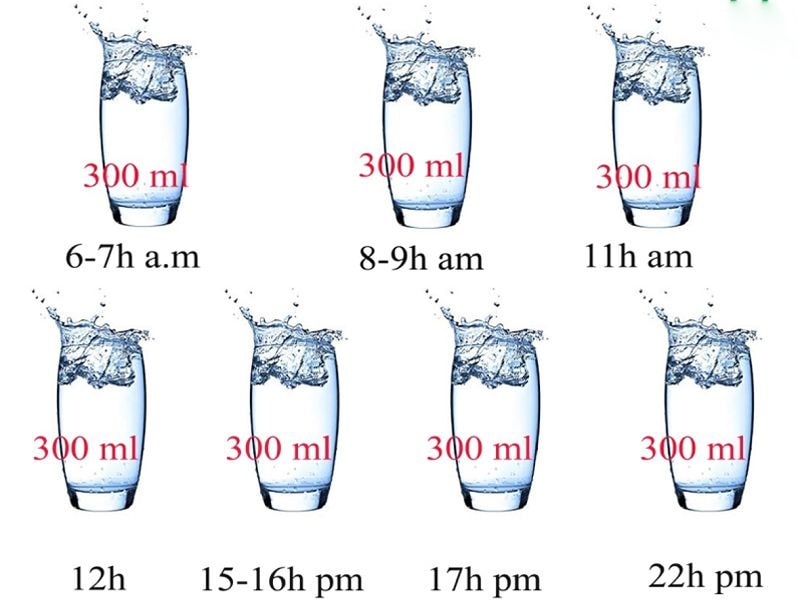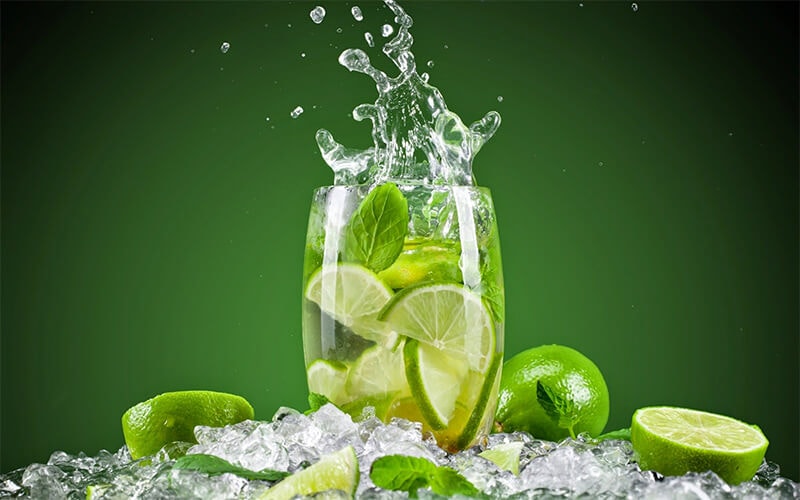How much water should you drink a day to effectively reduce acne?
Does drinking lots of water make acne go away? Or is there a specific formula for achieving healthy, beautiful skin? In this article, we will suggest the time and amount of water you should drink a day to effectively reduce acne.
- Why is water important for skin?
- So how much water a day is enough?
- How does water quality affect skin?
- Proper water drinking schedule to reduce acne?
- 1. Is it better to drink more water than recommended?
- 2. Does drinking tea or coffee count as water?
- 3. How do I know if I'm drinking enough water?
- 7 Day Water Plan to Reduce Acne
- Day 1-2: Establish a routine
- Day 3-5: Improve water quality
- Day 6-7: Maintenance and optimization
- Misconceptions about drinking water and reducing acne
Why is water important for skin?

The skin is the body's largest organ, accounting for about 15% of your body weight. It acts as a protective barrier and is also a reflection of your overall health. Acne can be caused by many things: excess oil, dead skin cells, bacteria, or hormonal imbalances. But did you know that dehydration can also aggravate acne?
When the body is dehydrated, the skin becomes dry, increasing oil production to compensate for the moisture. This leads to clogged pores, creating conditions for acne to develop. Conversely, drinking enough water helps:
- Detoxification:Water helps the kidneys and liver remove toxins, reducing the risk of acne-causing toxin buildup.
- Moisture balance:Moisturized skin will produce less oil, reducing the risk of clogged pores.
- Enhance blood circulation:Water helps blood circulate better, providing oxygen and nutrients to the skin.
So how much water a day is enough?

There is no one-size-fits-all answer to the question of 'how much water to drink a day to reduce acne'. The amount of water you need depends on many factors: your weight, age, activity level, climate, and skin condition. However, experts generally recommend:
- Average adult:2-3 liters of water per day (about 8-12 cups).
- Women:About 2-2.7 liters (as recommended by the US Institute of Medicine).
- Men:About 2.5-3.7 liters.
To personalize, you can use a simple formula:30-40ml water/kg body weightFor example, a person weighing 60kg needs about 1.8-2.4 liters of water per day.
How does water quality affect skin?
It’s not just the quantity of water you drink that matters, but the quality of the water you drink. Water that’s contaminated or heavily chlorinated can irritate your skin and make acne worse. Here’s a comparison of different types of water and how they affect your skin:
| Water type | Advantage | Disadvantages |
|---|---|---|
| Pure filtered water | Removes impurities, safe for skin and body. | Need quality water purifier, initial investment cost. |
| Tap water | Economical, accessible. | Contains chlorine, heavy metals, may cause skin irritation. |
| Mineral water | Provides beneficial minerals such as zinc, good for the skin. | High cost for long term use. |
| Homemade drinks (tea, juice) | More flavor, easy to drink. | May contain sugar, not suitable if consumed in excess. |
Advice:Use an RO water purifier or nano purifier to ensure clean, safe water. If you choose mineral water, check the label to ensure there are no harmful additives.
Proper water drinking schedule to reduce acne?
.jpg)
Just drinking enough water is not enough. How you drink water also affects the effectiveness of acne reduction. Here are specific action steps:
- Divide the amount of water during the day:Instead of drinking 2 liters of water at once, divide it into 8-10 glasses, drinking regularly every 1-2 hours. For example: 1 glass when waking up, 1 glass before each meal, and 1 glass before going to bed.
- Drink warm water:Warm water helps stimulate digestion and blood circulation, and is better than cold water at eliminating toxins.
- Add skin boosters:You can add a few slices of lemon, cucumber, or mint leaves to your water to increase vitamin C and antioxidants, helping to reduce acne inflammation.
- Avoid drinking too much before bed:Drinking too much water at night can cause edema, making the skin less fresh.
- Diet combination:Drinking water is not a substitute for a healthy diet. Limit fried foods, sugar, and dairy – common acne triggers.

1. Is it better to drink more water than recommended?
Not necessarily. Drinking too much water (over 4-5 liters/day) can cause electrolyte imbalance, overloading the kidneys. Follow the amount of water that is right for your body.
2. Does drinking tea or coffee count as water?
Partly, but not entirely. Tea and coffee are diuretics, which dehydrate the body. Opt for water and limit caffeinated drinks.
3. How do I know if I'm drinking enough water?
Signs of adequate hydration: pale yellow urine, moist skin, and dry lips. If your urine is dark or you are often thirsty, increase your water intake.
7 Day Water Plan to Reduce Acne
.jpg)
To help you get started, here's a 7-day water plan, combined with basic skin care:
Day 1-2: Establish a routine
- Drink a glass of warm water with a few drops of lemon as soon as you wake up.
- Divide 2 liters of water into 8 cups, drink evenly throughout the day.
- Wash your face twice daily with a mild, alcohol-free cleanser.
Day 3-5: Improve water quality
- Try adding 1-2 cucumber slices or mint leaves to your drinking water.
- Eat lots of green vegetables and water-rich fruits (watermelon, oranges, cucumbers).
- Use a water filter to ensure clean water.
Day 6-7: Maintenance and optimization
- Check your daily water intake and adjust if necessary.
- Combine with the right moisturizer to lock in moisture to your skin.
- Get 7-8 hours of sleep to optimize detoxification.
Misconceptions about drinking water and reducing acne
Myth 1:Just drink water and the acne will disappear.
Truth:Water helps reduce acne, but it’s not a “silver bullet.” You need to combine it with a healthy diet, skin care, and lifestyle.
Myth 2:The more water you drink, the better.
Truth:Drinking too much water does not improve your skin but is harmful to your body.
Drinking enough water every day is an important step but not everything. To effectively reduce acne, you need to drink the right amount, in the right way, use clean water, and combine it with scientific skin care. Start by calculating the amount of water your body needs, divide the time to drink, and monitor the changes in your skin after 1-2 weeks. You will be surprised by the results!



.png)
.png)
